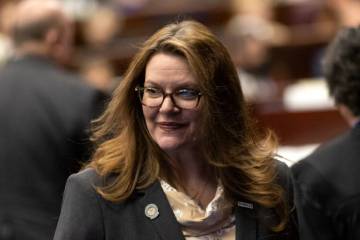Here’s what legislators did to address mental health issues in Nevada
As Nevada continues to rank near the bottom nationally for its handling of mental health, lawmakers made strides this past legislative session to address gaps in the state’s mental health services.
Legislators voted to approve a handful of bills aimed at battling the continued prevalence of mental illness in the state, passing legislation to increase access to medications and expand Nevada’s behavioral health care workforce.
Among those, advocates say a law prohibiting the use of a practice known as step therapy is the biggest win.
Step therapy
Step therapy is a practice used by insurance companies to reduce costs by requiring a patient to try a lower cost medication before trying a similar but more expensive drug. Through Senate Bill 167, the practice is prohibited for medications meant to treat psychiatric conditions when prescribed by certain providers.
And that’s important because step therapy can extend the amount of time an individual experiencing mental illness experiences symptoms and can open them up to side effects, said Robin Reedy, executive director of Nevada’s National Alliance on Mental Illness chapter.
Reedy said that in a majority of cases, patients found that the less expensive alternative was not effective.
“What if that 50 percent it doesn’t work for is your husband, your wife, your daughter, your granddaughter?” Reedy said.
The legislation applies to individuals covered by Medicaid, private insurance companies and the Public Employees’ Benefits Program. Individuals who are denied psychiatric medication that they have been prescribed can submit complaints with the state Division of Insurance and can reach out to the Office of Consumer Health Assistance.
‘Grow your own’ workforce development
Lawmakers also passed legislation meant to address the shortage of behavioral health providers in the state, approving bills meant to grow the supply right here at home.
Assembly Bill 37, introduced on behalf of the Rural Behavioral Health Policy Board, authorizes the creation of the Behavioral Health Workforce Development Center.
The center, which will be housed at one of the state’s higher education institutions, is based off a model developed at the University of Nebraska over a decade ago, said Sara Hunt, an assistant dean for behavioral health sciences at UNLV’s medical school.
Hunt, who assisted with the legislation’s formation, said the program aims to “grow a group of mental health professionals that are already from Nevada, who feel that connection to their communities and want to go get higher education to become a licensed mental health professional, and return to their communities to serve the mental health needs of their community.”
Much of that work begins with education about careers in the mental health field. Outreach efforts are set to start with presentations to K-12 students but also will seek to reach those interested in making a career change and adult learners, Hunt said.
The program also will train existing licensed mental health workforce members to be approved supervisors who can oversee the training of new graduates.
“There’s usually a one- or two-year requirement for continued supervision while you’re seeing patients before you can get independently licensed,” Hunt said. “They were losing some students, some new graduates because they didn’t have enough board-approved supervisors that were approved by that licensing board to be qualified to oversee interns.”
Other progress
Other strides were made, too. Lawmakers passed Assembly Bill 45 and Assembly Bill 69, legislation meant to assist with the repayment of student loans for certain health care providers.
Lawmakers also approved legislation to make the expansion of insurance for certain telehealth services permanent, a move that’s important to growing access to care, Hunt said. Assembly Bill 276 clarified the definition of telehealth, and Senate Bill 119 requires certain insurance companies to continue covering services provided through telehealth.
Another bill, Assembly Bill 138, will allow Medicaid providers to be reimbursed for collaborative care.
With collaborative care, a primary care provider is able to do a consultation with a specialist, like those specializing in substance abuse disorders, addiction and psychiatry. Both providers are then reimbursed for the cost of providing that care, and the Medicaid patient can get that tailored psychiatric and behavioral health care from their primary care provider rather than waiting to get into a specialist.
“This lets those providers get the expertise they need to better treat their patients,” said Lea Case, vice president at Belz Case Government Affairs.
Vetoed bills
Not every bill made it over the final hurdle at Gov. Joe Lombardo’s desk. Among the 75 bills vetoed on his desk was Assembly Bill 265, which would have created a statewide mental health consortium and unified efforts between the existing regional consortia.
In a letter explaining his veto of the bill, Lombardo said it contained “an unfunded mandate” and added “an unnecessary layer of bureaucracy.”
“Since AB265 does little to address the primary issue plaguing our mental health crisis — that we do not have enough beds to adequately serve those struggling with mental health issues — I cannot support it,” Lombardo wrote.
Amanda Haboush-Deloye, chair of the Clark County Children’s Mental Health Consortium, said she was disappointed by the governor’s veto of the legislation.
“We don’t agree that our group doesn’t have any impact,” Haboush-Deloye said. “We think there’s a lot of value of the three consortium coming together to be able to discuss issues that overlap statewide, and we’ve helped each other a lot.”
The three consortia already meet, but the bill would have codified those meetings and guaranteed they would continue, she said.
The governor also vetoed Assembly Bill 201. The bill would have required the Division of Public and Behavioral Health and the Division of Child and Family Services to create plans for providing behavioral health services and would have required the state’s regional behavioral health boards to advise DCFS.
In a veto message dated June 16, Lombardo said the bill adds work for the Department of Health and Human Services without providing additional resources.
Contact Taylor R. Avery at TAvery@reviewjournal.com. Follow @travery98 on Twitter.






















